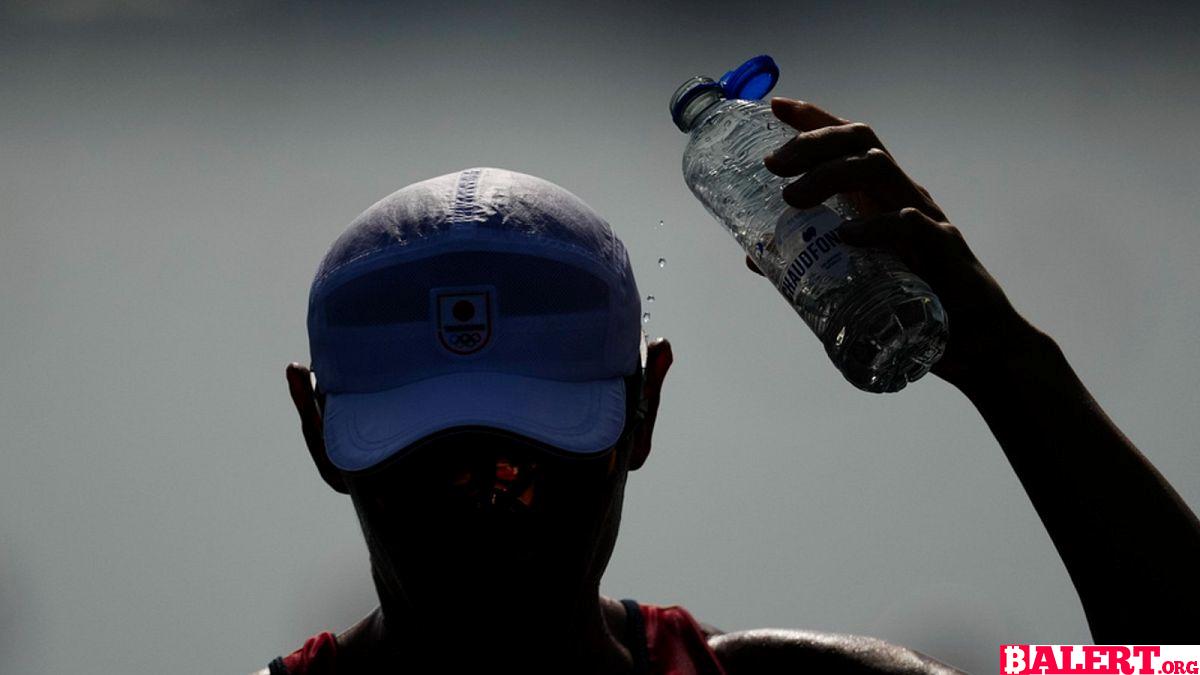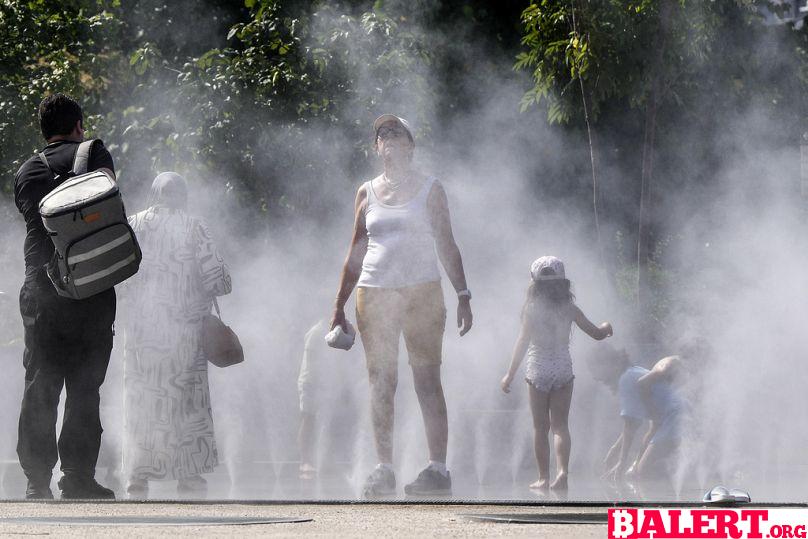World
2024 Olympics: Athletes Tackle Extreme Weather Challenges
Explore how athletes at the 2024 Olympics are facing extreme weather challenges, from scorching heat to unpredictable storms. Discover their innovative strategies, rigorous training, and the resilience needed to compete at the highest level.

The 2024 Olympics: Battling the Elements
The 2024 Olympics kicked off with an opening ceremony that was drenched in rain, leaving both athletes and spectators soaked. However, just two days later, the weather took a drastic turn, presenting a different challenge altogether. Paris experienced a heatwave, with temperatures soaring to a sweltering 36 degrees Celsius.
Among the athletes, US gymnastics gold medalist Simone Biles took to Instagram to share her struggles with the extreme heat and lack of air conditioning. “Don’t come for me about my hair,” Biles humorously noted before the gymnastics team final. “IT WAS DONE but the bus has NO AC, and it feels like 9,000 degrees. Oh, and a 45-minute ride!”
As visitors and athletes braved the sweltering heat, they looked forward to a cooling change with thunderstorms predicted to sweep through the Paris area later in the evening. In the meantime, many sought relief by splashing into the cool waters of a popular swimming canal or finding respite under the shade at the exposed Olympic venues.
UK tourist Sarah David perfectly encapsulated the day’s strategy: “Eating lots of ice cream, drinking plenty of water, and I even bought a new fan!”
Coping with the Heat: Creative Solutions for Volunteers and Spectators
To help combat the extreme temperatures, volunteers at the beach volleyball stadium near the iconic Eiffel Tower employed hoses to spray down cheering fans and put up signs directing people to water refill stations. Spectators sought shelter under trees, while athletes playing on the sunbaked sand—often 20°C hotter than the air—were granted extra breaks to drape bags of ice over their bodies.
Egyptian beach volleyball player Doaa Elghobashy shared her experience, stating, “Very hot, but not like Egypt,” after competing in long sleeves, trousers, and a hijab.
People found solace in misting fountains set up in various parts of Paris and venues like La Concorde urban park, which hosted events such as skateboarding and BMX freestyle cycling. The local train and metro operator stepped up efforts by distributing over 2.5 million containers of water at more than 70 train stations and bus stops throughout the network.
The New Zealand women’s rugby sevens team resorted to slushies, ice blocks, shade, and cold baths to stay cool prior to their matches. Captain Sarah Hirini remarked, “We’ve got everything we possibly can to cool down before the game. When you play sevens, it’s hard.”
Protecting Animals: Equestrian Teams Adapt to the Heat

In the equestrian events, teams took extra precautions to ensure the well-being of their horses. Riders sprayed their steeds with cool water and kept them shaded after competing on the course. The warm-up sessions were reduced from 45 minutes to just half an hour to help the animals cope with the heat inside the regal gardens of the Palace of Versailles, located just outside Paris.
British rider Carl Hester commented, “It’s really hot, but you have to be professional about it. We take lots of walk breaks so the horses can relax. Thankfully, we have a covered arena to shield them from the sun.”
Tennis Players Face the Heat: Emergency Protocols in Action
At Roland Garros, where tennis players battled it out on outdoor courts, organizers activated the initial phase of an “extreme weather” protocol. This allowed athletes in singles matches to request a 10-minute break before the third set, with the possibility of suspending play if conditions worsened.
British tennis player Jack Draper expressed his frustration, noting that he was not provided with enough cold water during his match. “I’m a big sweater,” Draper admitted, still perspiring heavily half an hour after his three-set loss to Taylor Fritz of the US. “The bottles don’t stay cool. We were drinking hot water out there.”
Canada’s Leylah Fernandez, the 2021 US Open runner-up, also voiced her concerns about the “crazy heat” following her elimination at the hands of Germany’s Angelique Kerber. “I trained in Spain and Miami, where it is hot—but this type of weather is different,” she explained. “Sometimes in a match, it’s a totally different environment. In the heat, you feel all your emotions… I didn’t manage it well.”
In light of the oppressive heat, French Prime Minister Gabriel Attal urged citizens to limit outdoor activities during peak hours, stay hydrated, seek shade, and protect vulnerable populations such as the elderly and young children. He reassured the public that the Olympics organizers were closely monitoring the “severe heat wave.”
World
Dominique Pelicot Testifies in Harrowing Rape Trial
Join us as Dominique Pelicot courageously testifies in a harrowing rape trial, shedding light on the complexities of trauma and justice. Her powerful story raises crucial questions about the legal system and the importance of support for survivors.

Dominique Pelicot Takes the Stand in Shocking Rape Trial
In a courtroom drama that has captivated France and garnered international attention, Dominique Pelicot, the man at the center of a harrowing rape trial, finally addressed the court. With tears streaming down his face, he recounted how his wife had been instrumental in helping him cope with a tumultuous past marked by trauma. He revealed that he had endured a sexual assault at the tender age of nine while hospitalized, and he also witnessed a gang rape during his teenage years while working as an apprentice electrician on a construction site.
“She didn’t deserve this, I acknowledge that,” Mr. Pelicot stated, his voice barely audible as he struggled to convey his emotions. The gravity of the situation weighed heavily on him, and the courtroom fell silent, straining to catch his every word.
Now 71 years old, Mr. Pelicot faces serious allegations of drugging his wife, Gisèle Pelicot, whom he has been married to for half a century, over a span of nearly ten years. Prosecutors contend that he used drugs to render her comatose, allowing him to rape her repeatedly. Furthermore, authorities allege that he went so far as to invite numerous men into their home, facilitating a nightmarish scenario where they, too, engaged in the assault of his wife.
Overall, 51 men, including Mr. Pelicot, are on trial concurrently, primarily facing charges related to the aggravated rape of Ms. Pelicot. Among them, one individual has already pleaded guilty to similar crimes, admitting to drugging his own wife to assault her and inviting Mr. Pelicot to partake in the horrific act while she was incapacitated.
Mr. Pelicot’s unexpected testimony came after a tumultuous start to the trial. Just a week in, he was stricken with severe health issues that forced him to miss four consecutive days in court. The head judge ultimately decided to postpone proceedings, as Mr. Pelicot was diagnosed with kidney stones, a kidney infection, and prostate complications, adding yet another layer of complexity to this already harrowing case.
World
Meta Bans Russian State Media Outlets from Social Media Platforms
Explore the implications of Meta’s decision to ban Russian state media outlets from its social media platforms. Understand the impact on information dissemination and the ongoing battle against misinformation in the digital landscape.

Meta Imposes Global Ban on Russian State Media Outlets
In a significant move, Meta Platforms, Inc., the parent company of Facebook, has announced the prohibition of Russian state media outlets, including RT (Russia Today) and Rossiya Segodnya, from all its social media platforms. The decision stems from the company’s concerns regarding the deceptive strategies employed by these media organizations to execute covert influence operations across the internet.
Meta made this announcement on Monday, emphasizing that the ban will be enforced worldwide across its various platforms, such as Instagram, WhatsApp, and Threads. The rollout of this ban is expected to take place over the coming days.
Statement from Meta
A spokesperson for Meta elaborated on the decision, stating, “After careful consideration, we have expanded our ongoing enforcement actions against Russian state media outlets. As a result, Rossiya Segodnya, RT, and other affiliated entities are now banned from our applications globally due to their involvement in foreign interference activities.”
For further insights into this development, watch the video in the player above.
World
Trump Recalls Alleged Assassination Attempt While Golfing
Explore Donald Trump’s chilling recollection of an alleged assassination attempt he experienced while enjoying a round of golf. Delve into the tense moments and his reflections on safety, fame, and the unpredictability of public life.

In a recent interview on the social media platform X, Republican presidential nominee Donald Trump recounted a harrowing incident he claims to have experienced while playing golf. Trump described how, during a peaceful Sunday morning round with friends, the tranquility of the day was abruptly shattered by the sound of gunfire in the air.
“It was a beautiful day, everything was just perfect,” Trump reflected. “Then all of a sudden, we heard shots being fired—probably around four or five in total.” He went on to explain that a Secret Service agent was the first to spot the suspect, who was allegedly armed with an AK-47, a powerful assault rifle.
“The agent saw the barrel of the weapon and immediately took action, returning fire at the barrel and aiming in the direction of the bushes,” Trump detailed. “I would have loved to have sunk that last putt, but we decided it was best to leave the scene promptly.”
Trump expressed his gratitude towards the agents and a vigilant civilian who aided in tracking down the suspect, who was eventually apprehended following a high-speed chase.
Suspect Faces Multiple Federal Gun Charges
The FBI has identified the suspect as Ryan Wesley Routh, accusing him of targeting Trump during his time at the golf club in West Palm Beach, Florida. According to an FBI report, Routh had allegedly hidden among the hedges of the golf course for an astonishing 12 hours. Authorities discovered an SKS-style assault rifle, a GoPro camera, and a bag of food at the scene.
The 58-year-old Routh is now facing two serious federal gun charges. If convicted on both counts, he could face a combined maximum sentence of 20 years in prison. Notably, neither of the charges is directly related to an assassination attempt. The first charge pertains to possessing a firearm despite a prior felony conviction, which carries a potential 15-year sentence, a fine of $250,000 (€225,000), and three years of supervised release.
The second charge involves possession of a firearm with an obliterated serial number, which could result in a five-year prison term, the same financial penalties, and also three years of supervised release. As the investigation continues, additional charges could be forthcoming.
While the motive behind Routh’s actions remains unclear, his digital footprint reveals strong political affiliations, particularly concerning issues surrounding Ukraine and China. Routh consistently expressed support for Ukraine across various social media platforms, even claiming to have orchestrated a recruitment scheme for international volunteers aiming to assist Ukraine in its fight against Russia’s invasion. This behavior has been denounced by Ukrainian soldiers and members of the International Legion, who disavowed Routh’s actions and motives.
-

 Business7 months ago
Business7 months agoThe Significance of Jackson Hole: A Central Banking Tradition
-

 Tech6 months ago
Tech6 months agoNew Leaks and Features About the Samsung Galaxy S25 Ultra
-

 Article9 months ago
Article9 months agoCreative Design Applications Developed with Artificial Intelligence
-

 Business6 months ago
Business6 months agoBhutan’s Strategic Investment in Bitcoin: A New Era for the Himalayan Kingdom
-

 Business8 months ago
Business8 months agoObituary: Dan Collins
-

 World6 months ago
World6 months agoThierry Breton Resigns: Impact on European Union Leadership
-

 Gaming6 months ago
Gaming6 months agoNew Details and Trailer Released for Dead Rising Deluxe Remaster
-

 Gaming6 months ago
Gaming6 months agoNew Details for Alan Wake 2 and PlayStation 5 Pro Announcement












